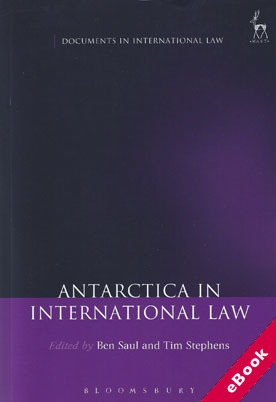
The device(s) you use to access the eBook content must be authorized with an Adobe ID before you download the product otherwise it will fail to register correctly.
For further information see https://www.wildy.com/ebook-formats
Once the order is confirmed an automated e-mail will be sent to you to allow you to download the eBook.
All eBooks are supplied firm sale and cannot be returned. If you believe there is a fault with your eBook then contact us on ebooks@wildy.com and we will help in resolving the issue. This does not affect your statutory rights.
Antarctica, one of the world's last great wildernesses, presents special challenges for international law. Fears that Antarctica would become a front in the Cold War catalysed agreement on the 1959 Antarctic Treaty which neither legitimized nor challenged the existing sovereign claims to the continent.
The unique Antarctic Treaty System has provided the foundation for peaceful, harmonious and effective governance. There are, however, new anxieties about the frozen continent and the Southern Ocean. Antarctica already feels the effects of climate change and ocean acidification.
Claimant states assert rights to the Antarctic continental shelf and interest in Antarctic resources grows. Tourism brings new environmental and safety risks. China and other powers are increasing their activities, with some questioning the consensus of the 'Antarctic club'. Security concerns are increasingly discussed, despite Antarctica's dedication to peaceful purposes.
This book brings together the main primary international materials concerning the regulation and governance of Antarctica, including multilateral and bilateral treaties, United Nations materials, 'soft laws', and judicial decisions. It covers the spectrum of Antarctic issues from environmental protection to scientific cooperation to tourism. As it shows, Antarctic law has constantly adapted to meet new challenges and is a sophisticated, inclusive, dynamic and responsive regime.